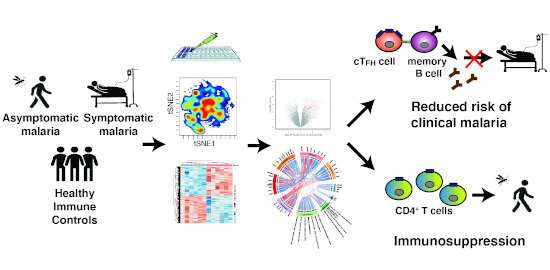New discovery to improve malaria elimination strategies

WEHI researchers have made a crucial discovery about how asymptomatic malaria infections impact the body, informing potential strategies to control transmission and improve treatment outcomes.
The research team has shown that persistent, asymptomatic malaria infections are not innocuous as previously believed. Instead, these infections suppress the immune system, preventing it from eradicating parasites from the bloodstream.
The findings published in Molecular Systems Biology provide an alternative view to the long-held belief that asymptomatic malaria infections are beneficial to help reduce the risk of severe disease, and suggest that treating chronic infections could enhance vaccine effectiveness and reduce transmission.
The study was led by WEHI Ph.D. student Stephanie Studniberg and Associate Professor Diana Hansen in collaboration with researchers from Indonesia's Eijkman Institute for Molecular Biology, the Papuan Health and Community Foundation, and the Menzies School of Health Research at Charles Darwin University.
Is asymptomatic malaria a problem?
Malaria remains one of the most serious infectious diseases of humans with over 200 million clinical cases and 600,000 deaths estimated in 2020.
Some people can develop immunity to the malaria parasite Plasmodium falciparum after many years of repeated infections. In these patients, a small number of parasites continue to live silently in the bloodstream but do not cause fever-like symptoms.
"These infections have historically been viewed as beneficial because they were thought to offer protection against symptomatic disease," said Associate Professor Hansen.
"Based on this assumption, asymptomatic malaria is often left untreated in countries where malaria is endemic, despite our poor understanding of the real impact that these persistent infections have on people."
New studies report asymptomatic infections are responsible for up to half of new transmissions, often sliding under the radar and sabotaging efforts of malaria elimination programs.
Asymptomatic infections are not benign
To investigate the real impact of asymptomatic disease, the research team analyzed the white blood cells of patients carrying asymptomatic and symptomatic infections in an endemic area of Indonesia.
They found that patients with chronic asymptomatic malaria infections upregulated genes that suppressed the immune system, making more proteins to help the parasites survive.
Associate Professor Hansen said that because the immune system is suppressed and cannot work at full capacity, the body cannot take control of the parasites and clear them from the bloodstream.
A new strategy to fight malaria
Immunosuppression caused by asymptomatic malaria infections could have critical implications for the administration of malaria vaccines and elimination strategies around the world.
"In an immunosuppressed individual carrying an asymptomatic malaria infection, the effectiveness of the malaria vaccine is reduced as the immune system does not have the capacity to be trained appropriately," said Associate Professor Hansen.
"If we were to treat individuals with asymptomatic malaria infections, we would also reduce the invisible parasite reservoir that perpetuates transmission and deters efforts of malaria elimination campaigns."
The new information provides a framework to consider new polices supporting screening and treatment of asymptomatic malaria in endemic areas around the world.
More information: Stephanie I Studniberg et al, Molecular profiling reveals features of clinical immunity and immunosuppression in asymptomatic P. falciparum malaria, Molecular Systems Biology (2022). DOI: 10.15252/msb.202110824

















